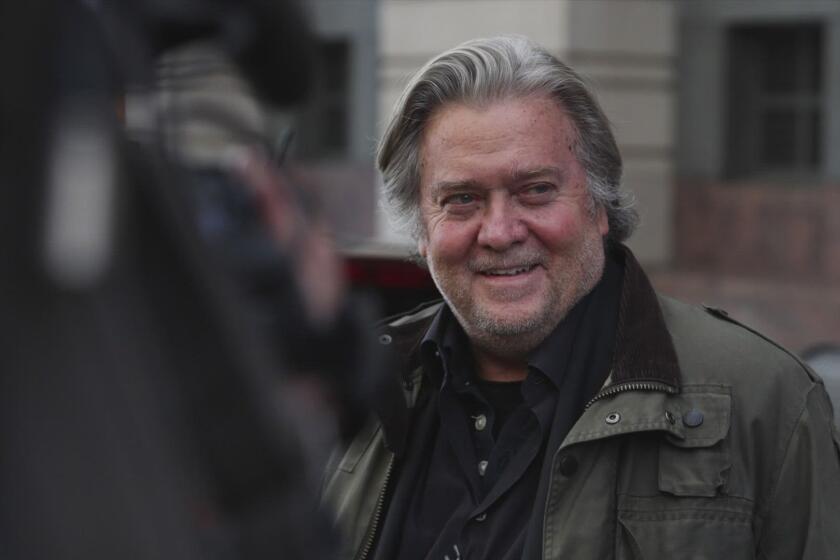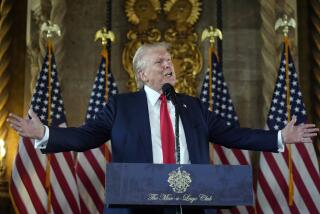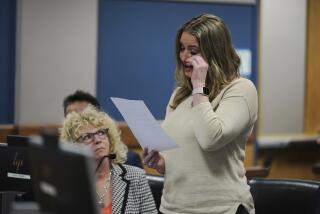Trump ally Stephen Bannon pleads guilty and avoids jail time in border wall fraud case

- Share via
NEW YORK — Stephen K. Bannon pleaded guilty on Tuesday to a fraud charge related to duping donors who gave money to a private effort to build a wall along the U.S. southern border — a case the conservative strategist has decried as a “political persecution.”
Bannon, a longtime ally of President Trump, reached a plea agreement that spares him from jail time in the “We Build the Wall” scheme.
He pleaded guilty to one count of scheming to defraud and received a three-year conditional discharge, which requires that he stay out of trouble to avoid additional punishment.
Asked how he was feeling as he left the courtroom, Bannon said: “Like a million bucks.”
Bannon spoke to reporters afterward and called on U.S. Atty. Gen. Pam Bondi to begin a criminal investigation into New York Atty. Gen. Letitia James and Manhattan District Atty. Alvin Bragg. Bannon’s deal comes days after Bondi ordered the Justice Department to investigate what the president claims is the “weaponization of prosecutorial power.”
Former Trump strategist Steve Bannon and three others are accused of diverting money they raised from people who wanted to help build a border wall the president wants.
Bragg’s office charged Bannon in state court after a Trump pardon in 2021 wiped away federal charges on the same allegations.
The district attorney’s office said Bannon is barred from fundraising for or serving as “an officer, director, or in any other fiduciary position” for any charitable organization with assets in New York state, under the plea agreement. He’s also barred from using, selling or possessing any data gathered from donors to the border wall scheme.
“This resolution achieves our primary goal: to protect New York’s charities and New Yorkers’ charitable giving from fraud,” Bragg said in a statement.
“New York has an important interest in rooting out fraud in our markets, our corporations, and our charities, and we will continue to do just that,” he added.
In November, Judge April Newbauer ruled prosecutors could show jurors certain evidence, including an email they say shows Bannon was concerned the fundraising effort was “a scam.”
Bannon had been planning an aggressive defense strategy and recently hired new lawyers who sought to portray the case to jurors as a selective and malicious prosecution.
In January, Bannon’s lawyers filed papers asking Newbauer to throw out the case, calling it an “unconstitutional selective enforcement of the law.” The judge had been expected to rule on that on Tuesday before Bannon’s plea deal made the request moot.
Bannon, 71, pleaded not guilty in September 2022 to a state court indictment charging him with money laundering, fraud and conspiracy. He was accused of falsely promising donors that all money given to the We Build the Wall campaign would go toward building a wall along the U.S.-Mexico border. Instead, prosecutors alleged the money was used to enrich Bannon and others involved in the project.
The wall campaign, launched in 2018 after Trump fired Bannon as his chief strategist, quickly raised more than $20 million and privately built a few miles of fencing along the border. It soon ran into trouble with the International Boundary and Water Commission, came under federal investigation and drew criticism from Trump, the Republican whose policy the charity was founded to support.
Bragg, a Democrat, took up the case after Trump cut Bannon’s federal prosecution short with a pardon in the final hours of his first term in the White House. Presidential pardons apply only to federal crimes, not state offenses.
Early in the fundraising campaign, Bannon pooh-poohed it, prosecutors said at a November hearing.
“Isn’t this a scam? You can’t build the wall for this much money,” Bannon wrote in an email, according to prosecutor Jeffrey Levinson. He said Bannon went on to add: “Poor Americans shouldn’t be using hard-earned money to chase something not doable.”
Two other men involved in the project, Brian Kolfage and Andrew Badolato, pleaded guilty to federal charges and were sentenced to prison. Another defendant, Timothy Shea, was convicted and also sentenced to prison.
Bannon went to prison in an unrelated case last year, serving four months at a federal lockup in Connecticut for defying a subpoena in the congressional investigation into the U.S. Capitol attack on Jan. 6, 2021. He was released in October.
Sisak writes for the Associated Press.
More to Read
Sign up for Essential California
The most important California stories and recommendations in your inbox every morning.
You may occasionally receive promotional content from the Los Angeles Times.











